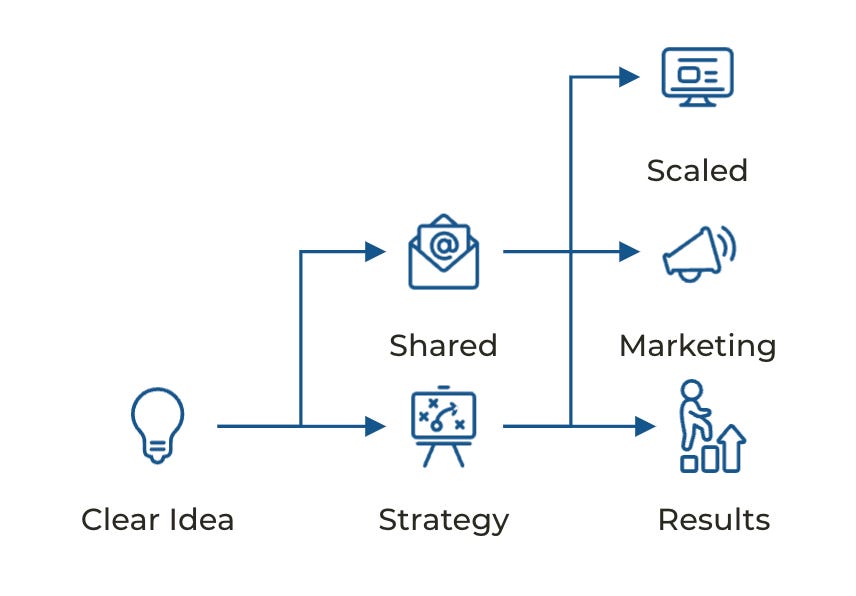Getting Clear
The type of writing you produce is less important than the quality of your ideas.
“Writer’s block is not a shortage of ideas. It is a disconnect between the voice in your head and the voice you want to see on the page.” - Write of Passage
As most of you know, I’ve been working on an app that lets visionary thinkers share their ideas, respond to a few questions, and then get a first draft with generative AI. It’s been a journey!
A common question we get is, “What kind of writing does it create?” Writing is a broad topic, it covers everything from short text messages like “I’m five minutes late” to full-length books. We help people with medium-form ideas. Things that fit in 1-2 pages. The statements serve as essential nuggets of information for complex ideas. We have special routines for journaling, meeting prep, meeting synthesis, and writing complex emails, and the list continues to grow.
Every founder knows that the more focused you can be on the problem you’re trying to solve, the easier it will be to get great results. Users need to know what it does and how it helps. The team needs to know where to focus their energy. Investors want to know how to beat the competition and accelerate feedback loops to win. For all these reasons (and more) it might help to focus on a single type of written output. But the thing about writing is that it’s not just a result, it is a process. When we were still testing our app with beta users, we queried our database to understand the intended audience of our user’s results. Here’s what we found.
28% of the time the audience was small. An email, product feedback suggestions, or meeting notes crafted for a peer.
But what about the rest? A whopping 50% were people clarifying their own ideas. These writings were not necessarily intended for anyone. They were personal notes. People working to understand and evolve their ideas.
After we noticed this we started thinking about moving people from Self to Shared to Scaled. The idea was that we should get people to post more and more things online. There are, after all, lots of benefits to being public with your thoughts. You get more feedback. You get more done. Writing online is a valuable skill. But is that really the goal?
When I showed an early draft of this article to Aurora Klaeboe Berg at a weekly writers' group meeting, she noted that the real goal is getting clear. Sharing writing online doesn’t mean that people will read it. The hard part is creating a message that people want to share.
My new mental model looks like this:
It doesn’t matter if you talk or type. Clarifying your ideas often involves both. The goal is to get your ideas out of your head and evolve them to find the most important part. Our question model helps people do this. So does the feedback provided by colleagues and friends. Getting to a first draft is probably the hardest part. If you need to modify it, that’s ok. You’re on your way.
Once you have your golden nugget, the other components tend to fall into place. Your messages make more sense. Your strategy becomes clear. People understand what you mean when you post online, and marketing campaigns lead to results. But it doesn’t have to be posted online. Connecting with someone in a meaningful way often has equal rewards. It’s the clarity of intent that counts.







I spent the better half of this morning fine-tuning instructions to a custom GPT I created to help me clarify ideas. The biggest benefit so far has not been a GPT that helps me clarify ideas. It has been getting clarity of the different roles my brain takes from inception to completion of a piece, so I can organize the instructions to the AI. But one of the most helpful steps was to ask the GPT: what instructions were you given? The GPT returned my own instructions but more streamlined.
It has to be a back and forth, doesn't it... Whether between people-only, or even in... mixed company.